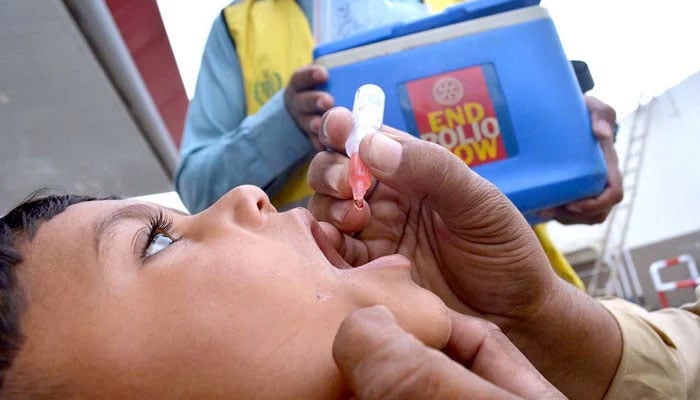Poliovirus found for first time in Faisalabad sewage
ISLAMABAD: The regional reference laboratory for polio eradication at the National Institute of Health (NIH) in Islamabad has confirmed the detection of Type-1 Wild Poliovirus (WPV1) in six environmental (sewage) samples collected in March 2024, including two from district Karachi’s Kaemari and one each from districts Hyderabad, Multan, Faisalabad, and Quetta, officials said on Friday.
Officials from the Polio Eradication Initiative (PEI) claimed that all six samples contain the YB3A poliovirus genetic cluster, which had disappeared from Pakistan in 2021, remained in circulation in Afghanistan, and was reintroduced through cross-border transmission in January 2023.
In the Kaemari district of Karachi, the environmental sample was collected on March 4, 2024, from the ‘Orangi Nala’ environmental sample collection site, marking the fifth positive sample from District Kaemari this year. The previous four positive samples were collected on January 3, January 8, February 13, and February 14, 2024. The isolated virus is classified as the YB3A cluster and is 99.77% genetically linked to the virus detected in an environmental sample in Karachi East on January 11, 2024.
The second environmental sample was collected on March 5, 2024, from the Muhammad Khan Colony’s environmental sample collection site in District Kaemari, Karachi, marking the sixth positive sample this year. The isolated virus is classified as the YB3A cluster and is 99.89% genetically linked to the virus detected in an environmental sample in the same district (Karachi Keamari) on February 13, 2024.
In Hyderabad, the environmental sample was collected on March 4, 2024, from the Tulsidas Pumping Station environmental sample collection site, marking the third positive sample from District Hyderabad this year.
The previous two positive samples were collected on January 8 and February 13, 2024. The isolated virus is classified as the YB3A cluster and is 99.89% genetically linked to the virus detected in an environmental sample in Karachi Central on February 15, 2024.
In Multan, the environmental sample was collected on March 5, 2024, from the Kotla Abdul Fateh environmental sample collection site, marking the second positive sample from District Multan this year. The previous positive sample from the district was collected on February 6, 2024. The isolated virus is classified as the YB3A cluster and is 99.77% genetically linked to the virus detected in an environmental sample in Karachi East on January 11, 2024.
In Faisalabad, the environmental sample was collected on March 4, 2024, from the Pumping Station-3 Achikaria environmental sample collection site, marking the first positive sample from District Faisalabad this year. The previous positive sample from the district was collected on November 7, 2022. The isolated virus is classified as the YB3A cluster and is 99.77% genetically linked to the virus detected in an environmental sample in Karachi East on February 21, 2024.
In Quetta, the environmental sample was collected on March 4, 2024, from the Railway Pul environmental sample collection site, marking the ninth positive sample from District Quetta this year. The previous eight positive samples were collected on January 2, January 15 (n = 2), January 16, and February 20 (n = 2), and February 21, 2024 (n = 2). The isolated virus is classified as the YB3A cluster and is 99.89% genetically linked to the virus detected in an environmental sample in Karachi Keamari on March 4, 2024.
These new detections bring the total number of positive environmental (sewage) samples for WPV1 in Pakistan in 2024 to 71.
-
 Annular Solar Eclipse 2026: Where And How To Watch ‘ring Of Fire’
Annular Solar Eclipse 2026: Where And How To Watch ‘ring Of Fire’ -
 Zayn Malik Explains Past Comments About Not Being In Love With Gigi Hadid
Zayn Malik Explains Past Comments About Not Being In Love With Gigi Hadid -
 Internet Reacts To 10 Days Flight Ban Over El Paso
Internet Reacts To 10 Days Flight Ban Over El Paso -
 YouTube Music Tests AI-powered ‘Your Week’ Recap To Summarise Listening Habits
YouTube Music Tests AI-powered ‘Your Week’ Recap To Summarise Listening Habits -
 Kelly Clarkson Ready To Date After Talk Show Exit?
Kelly Clarkson Ready To Date After Talk Show Exit? -
 Is AI Heading Into Dangerous Territory? Experts Warn Of Alarming New Trends
Is AI Heading Into Dangerous Territory? Experts Warn Of Alarming New Trends -
 Google Updates Search Tools To Simplify Removal Of Non-consensual Explicit Images
Google Updates Search Tools To Simplify Removal Of Non-consensual Explicit Images -
 Chilling Details Emerge On Jeffrey Epstein’s Parties: Satanic Rights Were Held & People Died In Rough Intimacy
Chilling Details Emerge On Jeffrey Epstein’s Parties: Satanic Rights Were Held & People Died In Rough Intimacy -
 50 Cent Gets Standing Ovation From Eminem In New 'award Video'
50 Cent Gets Standing Ovation From Eminem In New 'award Video' -
 Bad Bunny Delivers Sharp Message To Authorities In Super Bowl Halftime Show
Bad Bunny Delivers Sharp Message To Authorities In Super Bowl Halftime Show -
 Prince William 'worst Nightmare' Becomes Reality
Prince William 'worst Nightmare' Becomes Reality -
 Thai School Shooting: Gunman Opened Fire At School In Southern Thailand Holding Teachers, Students Hostage
Thai School Shooting: Gunman Opened Fire At School In Southern Thailand Holding Teachers, Students Hostage -
 Maxwell Could Get 'shot In The Back Of The Head' If Released: US Congressman
Maxwell Could Get 'shot In The Back Of The Head' If Released: US Congressman -
 Britain's Chief Prosecutor Breaks Silence After King Charles Vows To Answer All Andrew Questions
Britain's Chief Prosecutor Breaks Silence After King Charles Vows To Answer All Andrew Questions -
 New EU Strategy Aims To Curb Threat Of Malicious Drones
New EU Strategy Aims To Curb Threat Of Malicious Drones -
 Halle Berry On How 3 Previous Marriages Shaped Van Hunt Romance
Halle Berry On How 3 Previous Marriages Shaped Van Hunt Romance




